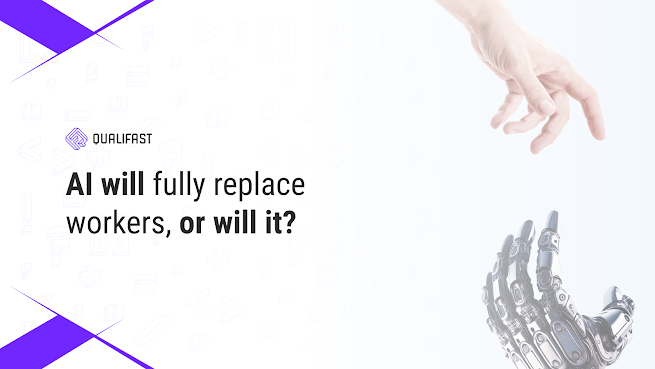AI will fully replace workers, or will it?
Plenty of people are hyped by the AI trend. Some are confident that soon humanity will become redundant, some are worried that they will lose their jobs and remain jobless, being forced into poverty by the all powerful AI. We would not delve into such high level speculations, but will rather try to make a practical analysis of the current state of things in a series of posts.
The first post focuses on the employer’s perspective on AI, presenting it as a software developing company, although the rationale loosely translates to most other industries too. By now it is probably obvious to everyone that current AI tools are capable of solving diverse tasks. Utilizing AI is already well proven to increase efficiency and thus only the unreasonable business owners will not consider embedding it into their processes.
Many people, for various reasons (demagogy, SHOCK! news, genuine fear), claim AI will fully replace human workers. A viral news from the recent past has interpreted Facebook’s Mark Zuckerberg as saying he will replace all engineers below senior level with AI. This stems from an interview he did with Joe Rogan where he says AI will soon be able to match mid level engineers with some sugar of interpretation added by viewers after that. This prospect is probably appealing to employers that hope to reduce salary expenditures switching to AI agents.
We believe that this prospect is nowhere near. Let us try to explain our position.
First let’s try to understand why Mr. Zuckerberg said that. Our basic formula we use to differentiate tiers of software engineers is the following:
- A junior software engineer needs constant monitoring and help. With this support, they are able to deliver tasks
- A mid level software engineer is independent on task level. Based on their experience they are able to independently do isolated tasks
- A senior software engineer has independence on component / module level. They are able to do relevant task breakdown, architect, plan and execute.
With this definition AI agents might achieve mid-tier performance on certain tasks very soon. To be frank, at the current moment what you get out of AI agents is very often something that seems like mid-tier performance. It is independently created, yes, but not that much solving the task at hand actually. This is something that not that many business owners realize, especially if they are not operational experts in their domain. Nonetheless, one might assume the gap between “seems” and “is” would be narrowed in course of time as AI models improve. We believe Mr. Zuckerberg based his words on similar grounds.
Even if we assume the above will be covered soon, there are a couple of big distinctions between AI “employee” and real human beings. Human personnel is always an investment: today they deliver with certain velocity and capabilities, but reasonable employers work with their employees to develop them. The plan is to have them deliver more in the future, potentially significantly more in the course of several years. Actually this is the most reliable way to get seniors in your organization: to breed them yourself. AI agents do not hold such promise for the future: they might be comparatively efficient today, but will not change too much tomorrow. Thus humans and AI differ in potential.
Maybe an even greater argument at the human employee’s side is that AI is currently not capable of genuine innovation. That is innovation that is understandable, maintainable and extendable. This is mostly due to the fact that AI structures its knowledge in a very different way: one that is good for inference, but not that much for abstraction and explanation (this will be covered in a separate post). However innovation is the greatest driver of value and growth for every organization.
It seems that while AI agents might do some work for you, you might be able to cut costs today while utilizing them. However, in the longer run you will lose if you rely too heavily on them. This is especially true if you use them as an argument to stop investing in people. Doing this, you deprive your organization of the possibility of growth and thus, inevitably, doom it eventually.

